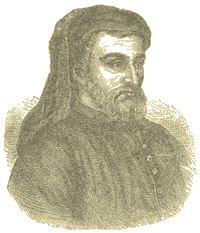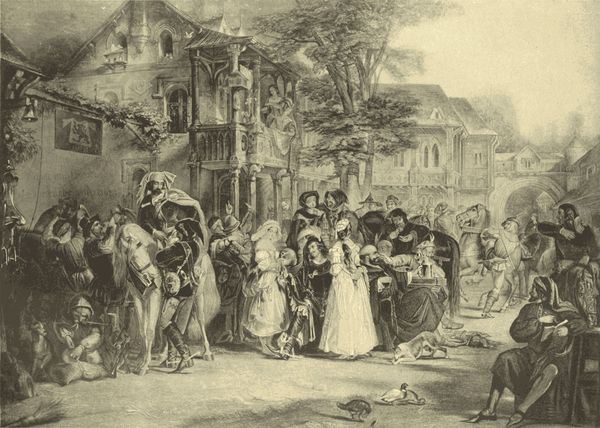 Geoffrey Chaucer, born around 1343 in London, is often referred to as the "Father of English Literature." He was a pivotal figure in the development of English as a literary language, and his works provide a rich portrayal of medieval society. Chaucer's most famous work, The Canterbury Tales, is a collection of stories told by a diverse group of pilgrims traveling to the shrine of Thomas Becket in Canterbury. This work is celebrated for its vivid characterizations, humor, and social commentary.
Geoffrey Chaucer, born around 1343 in London, is often referred to as the "Father of English Literature." He was a pivotal figure in the development of English as a literary language, and his works provide a rich portrayal of medieval society. Chaucer's most famous work, The Canterbury Tales, is a collection of stories told by a diverse group of pilgrims traveling to the shrine of Thomas Becket in Canterbury. This work is celebrated for its vivid characterizations, humor, and social commentary.
Chaucer's life was as varied as his writings. He served as a courtier, diplomat, and civil servant, working under three English kings: Edward III, Richard II, and Henry IV. His experiences and travels exposed him to different cultures and literary traditions, influencing his writing style and themes. Chaucer was well-versed in Latin, French, and Italian, and his works reflect the influence of writers such as Dante, Petrarch, and Boccaccio.
 In addition to The Canterbury Tales, Chaucer wrote several other significant works, including Troilus and Criseyde, a tragic love story set against the backdrop of the Trojan War, and The Book of the Duchess, an elegy mourning the death of Blanche of Lancaster. These works showcase his mastery of narrative and poetic forms, as well as his deep understanding of human nature.
In addition to The Canterbury Tales, Chaucer wrote several other significant works, including Troilus and Criseyde, a tragic love story set against the backdrop of the Trojan War, and The Book of the Duchess, an elegy mourning the death of Blanche of Lancaster. These works showcase his mastery of narrative and poetic forms, as well as his deep understanding of human nature.
Chaucer's contributions to English literature were groundbreaking. He chose to write in Middle English at a time when Latin and French were the dominant literary languages, thus elevating English to a respected literary medium. Geoffrey Chaucer died in 1400 and was buried in Westminster Abbey, an honor befitting his status as one of England's greatest poets. His legacy endures, and his works continue to be studied and celebrated for their literary merit and historical significance.
|
 Geoffrey Chaucer, born around 1343 in London, is often referred to as the "Father of English Literature." He was a pivotal figure in the development of English as a literary language, and his works provide a rich portrayal of medieval society. Chaucer's most famous work, The Canterbury Tales, is a collection of stories told by a diverse group of pilgrims traveling to the shrine of Thomas Becket in Canterbury. This work is celebrated for its vivid characterizations, humor, and social commentary.
Geoffrey Chaucer, born around 1343 in London, is often referred to as the "Father of English Literature." He was a pivotal figure in the development of English as a literary language, and his works provide a rich portrayal of medieval society. Chaucer's most famous work, The Canterbury Tales, is a collection of stories told by a diverse group of pilgrims traveling to the shrine of Thomas Becket in Canterbury. This work is celebrated for its vivid characterizations, humor, and social commentary.  In addition to The Canterbury Tales, Chaucer wrote several other significant works, including Troilus and Criseyde, a tragic love story set against the backdrop of the Trojan War, and The Book of the Duchess, an elegy mourning the death of Blanche of Lancaster. These works showcase his mastery of narrative and poetic forms, as well as his deep understanding of human nature.
In addition to The Canterbury Tales, Chaucer wrote several other significant works, including Troilus and Criseyde, a tragic love story set against the backdrop of the Trojan War, and The Book of the Duchess, an elegy mourning the death of Blanche of Lancaster. These works showcase his mastery of narrative and poetic forms, as well as his deep understanding of human nature. 





